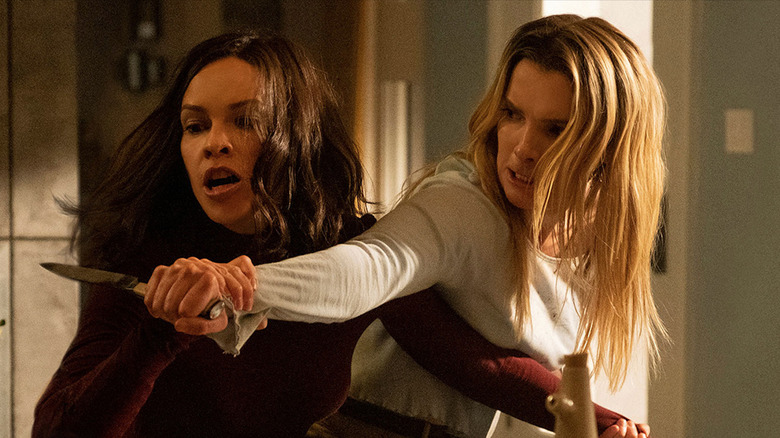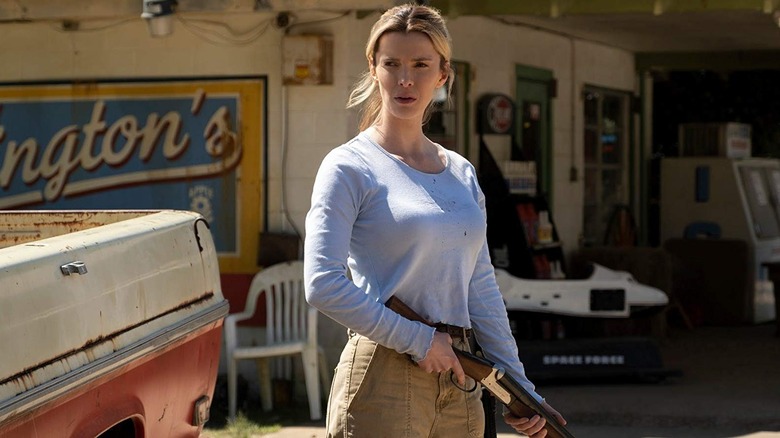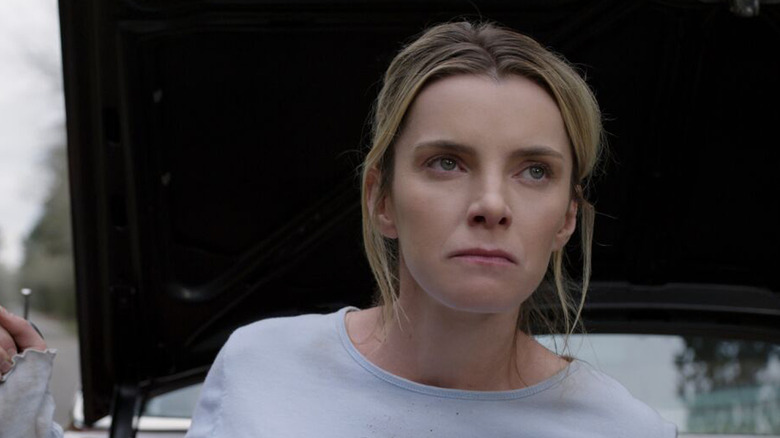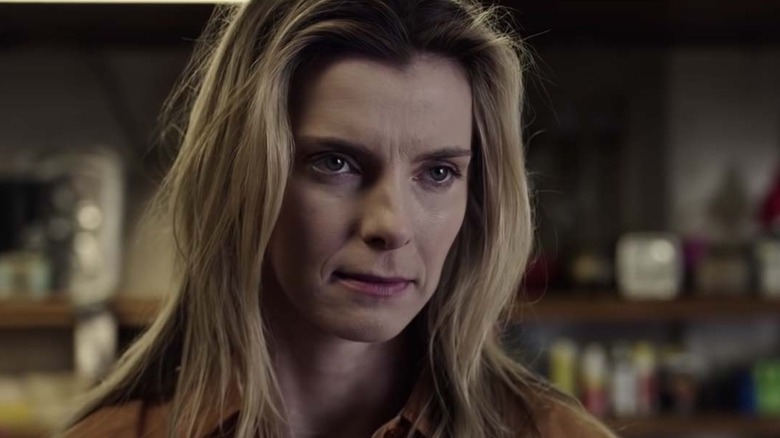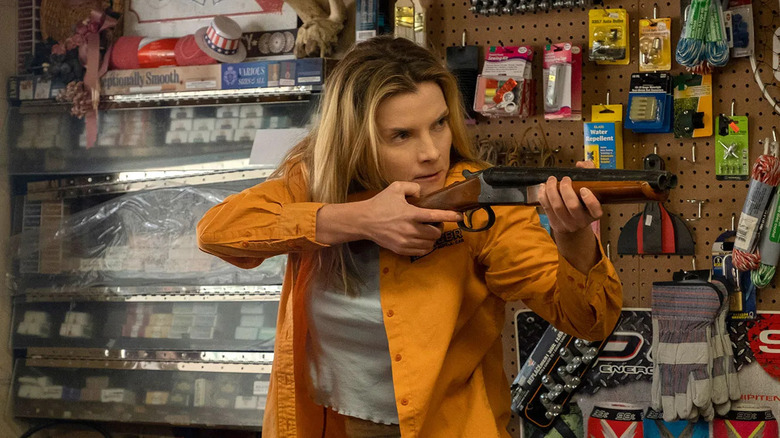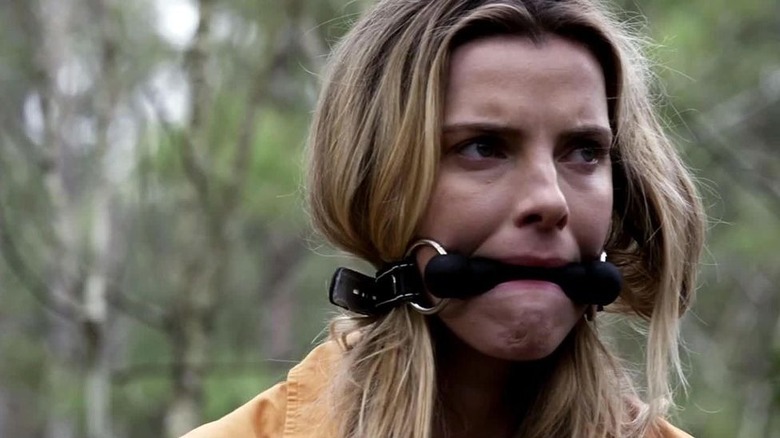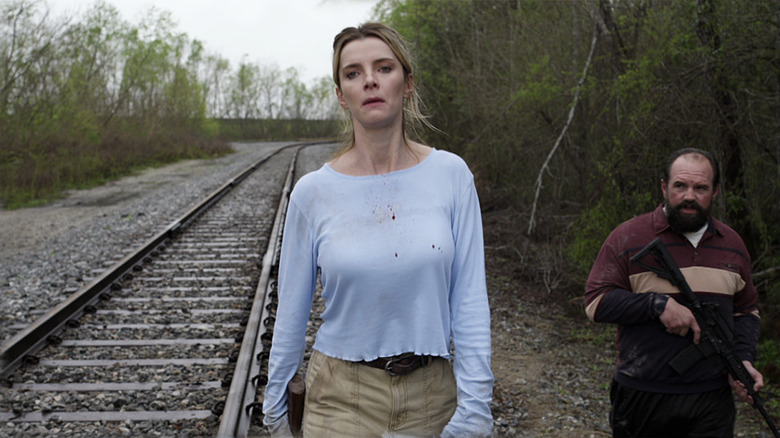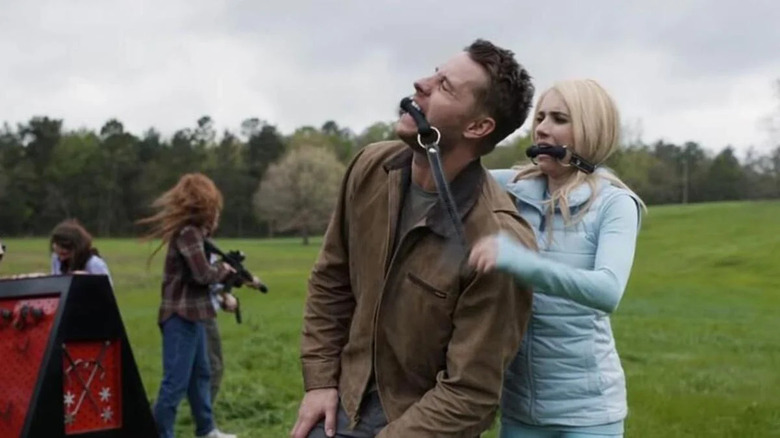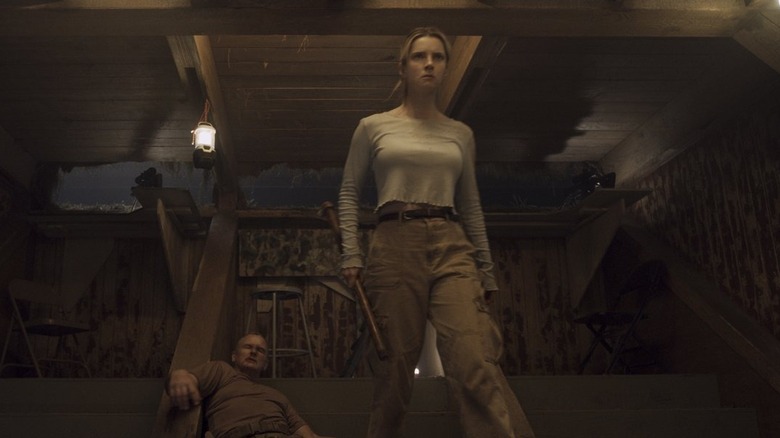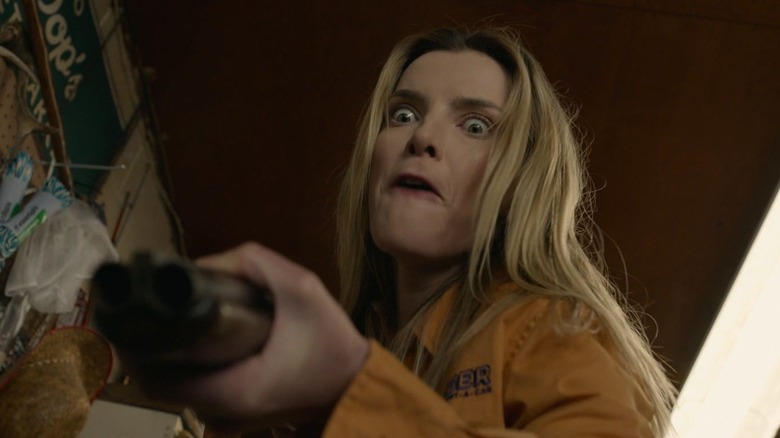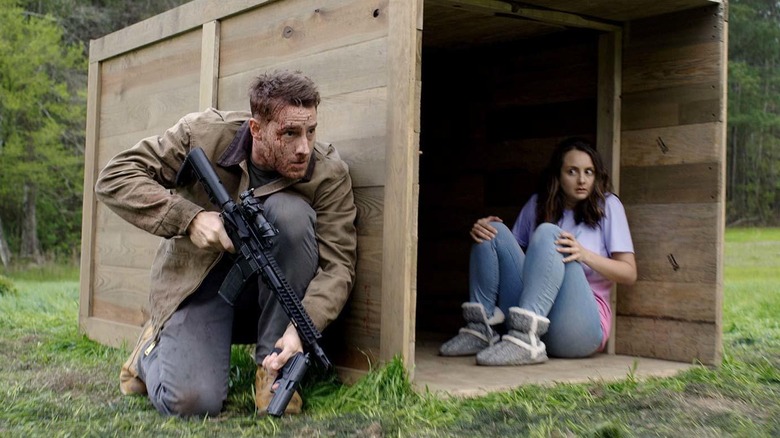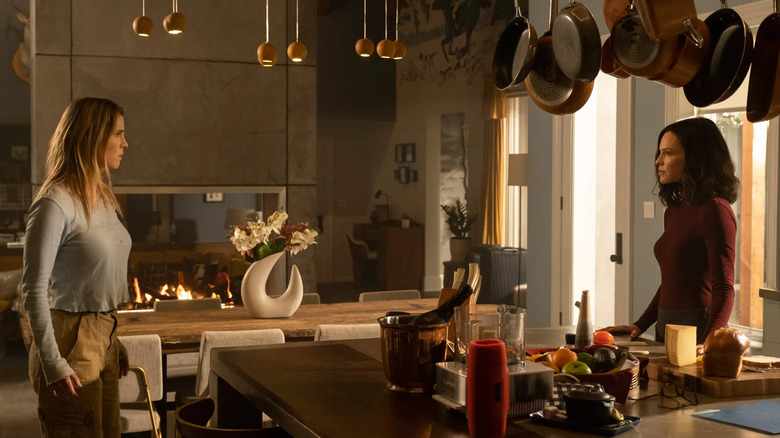The Ending Of The Hunt Explained
It's hard to think of a film that's had as much chaos and controversy leading up to its release as "The Hunt" did. Ironically, "The Hunt" didn't really suffer from production delays but faced multiple delays and setbacks due to outside criticism and tragedies. When it was supposed to originally release in 2019, Universal decided to pause the marketing campaign and pull ads due to recent mass shootings and gun violence. Then, the film started to receive backlash and criticism from conservative media and most notably former President Donald Trump for its subject matter of conservatives being hunted by liberal elites — despite no one having seen the film yet.
Unfortunately, "The Hunt" ended up also being a huge causality of the coronavirus pandemic, since theaters started to shut down directly after it hit theaters in March 2020. So it was forced into an expensive VOD run and was overshadowed by more pertinent news. Still, the film's satirical approach to relevant political and social tensions as well as the controversy surrounding it makes "The Hunt" worth talking about. Not to mention, the performances from Betty Gilpin and Hilary Swank and the finale's fight between their characters are a blast to watch. So let's delve into "The Hunt," its tense finale, and the legacy the "controversial" film has left behind.
What you need to remember about the plot of The Hunt
Before diving into the film's wild final bout, let's look at how the titular game came to be and the biggest parts of the film's central survival challenge. After a series of "joking" texts talking about killing "deplorable" conservatives causes a group of liberal-minded elites to lose their careers and social status, they turn their fantasy into reality. Led by Athena (Hilary Swank), the group of elites concocts a horrifying game where they capture different conservatives from around the U.S. and place them in a deadly game of survival. The goal of the game is for the conservative captives to find any and every way to survive as they are hunted down by their liberal captors. Although most of the conservatives get gunned down or blown to smithereens, there's one captive who puts up quite a fight — Crystal (Betty Gilpin).
Crystal is a Mississippi-born badass with incredible fighting and survival skills — which makes her more than capable of sniffing out ruses and fighting back against her captors. She's so skilled and deadly that she's able to kill almost every liberal hunter that she encounters. Now, Crystal only has Athena in her sights and is invited into her manor for a final showdown that'll see her face her greatest foe yet.
What happened at the end of the movie
Before Crystal is allowed to enter Athena's manor, she's forced to give up her gun; otherwise, she'll be blown up by a mine Athena controls. Once she's inside, Crystal comes across photos of the other captives that highlight why they were chosen. For instance, Big Game Shane (Justin Hartley) was taken for his profession as a big game hunter, and Gary (Ethan Suplee) was taken for being a conservative conspiracy theorist. Eventually, Crystal walks towards the sound of classical music — which leads her to find Athena in the kitchen. Although Crystal doesn't recognize Athena when she sees her, Athena says that she knows Crystal's story inside and out.
Athena gives Crystal a rundown of her entire life — from when both her parents were killed because of their ties to drugs to her inability to keep a job. The most important piece of information that Athena spills though is the reasoning behind Crystal being chosen — which was a social media post she wrote calling Athena a murderer and elitist. Athena then criticizes Crystal for "wanting" their messages about hunting down conservatives for sport to be true. Unfortunately for Athena, she has the wrong Crystal. Crystal informs Athena that there's actually another Crystal in her hometown with a similar name that isn't her and that Athena grabbed the wrong girl. In reality, though, Crystal knows that Athena doesn't care for the truth, and the two begin their final duel.
What happened to Crystal in the end
The big finale duel between Athena and Crystal sees them pull no punches against each other. These two use every dirty trick in the book to gain an edge and turn every kitchen tool and appliance they can get their hands on into a deadly weapon. It's a brutal fight to the very end, and despite Athena seemingly having the upper hand throughout the fight, she ends up being fatally stabbed by Crystal with a metal blade. Before she bleeds out, Athena comes to new realizations about Crystal. She's not only surprised when she sees that Crystal has read George Orwell's "Animal Farm" — which heavily inspired Athena and her counterparts — and has a very fitting perspective on her being likened to the character Snowball, but also is also given confirmation that she has the wrong Crystal.
When Athena finally dies from her wounds, Crystal is finally the last one standing and even sees a jackrabbit — which harkens back to a story she told Don (Wayne Duvall) earlier in the film. With nothing else to do but leave, she cauterizes her wounds and puts on some of Athena's nicer clothes before heading onto a private jet. On the plane, Crystal is finally able to relax as she sets a course back to Mississippi and even shares some of the caviar and fine wine with the flight attendant (Hannah Alline) — treating her better than Athena or her allies ever did.
What does the end of the movie mean
The biggest takeaway from "The Hunt" isn't necessarily some overarching theme or big character arc, but rather a self-reflective message about the current state of the sociopolitical climate. By showcasing archetypes from both sides of the aisle and highlighting their crude anger and hatred toward one another, "The Hunt" effectively delivers an important cautionary tale that evokes all the tension currently plaguing our relationships with one another. Though Athena and her allies were just "joking" when they talked about hunting and killing people they defined as "deplorables," Crystal does point out that they still went through with their plans instead of coming to understand that what they did was wrong. They chose to blame the people who called them out for them becoming killers rather than taking accountability for their own actions.
Ironically, though — based on what we hear throughout the film from some of the conservative captives — they're equally consumed by their own brand of hatred like their liberal captors. Instead of focusing on survival, the conservative characters often spew their own views on social issues without being provoked, and these characters reflect the reactionary nature of conservative politics in America. Both sides really reflect issues that hurt our ability to come together and have real conversations that can instill change. "The Hunt" is essentially a warning about our current status and an experience that's meant to make viewers recognize problems in our sociopolitical system and realize how worse our political situation could get.
Another explanation
While most of the characters in "The Hunt" are meant to create this warning for audiences of the horrifying places our state of hatred can lead us, Crystal's personal arc is meant to display something different. Rather than acting as a reminder of what not to be, Crystal is actually shown to be someone more level-headed. She doesn't reflect either side of the political spectrum and is a much more moderate force in the film. She doesn't entertain the vitriol and conspiracy theories of the other conservative captives she finds, nor does fit the mold for the liberal elites that are hunting her. Even in her final confrontation with Athena, Crystal is able to show a different side to herself in her knowledge and perspective on "Animal Farm," showing how Athena's snap judgment of her was dead wrong.
Crystal easily stands out amongst the rest of the survivors and even makes a more compassionate choice that everyone else in the film likely wouldn't make. At the end of the film, after all the killing and mayhem, instead of just taking all the fancy food for herself on the plane, Crystal decides to share it with the flight attendant since she finds a sense of commonality with her that stems from being looked down upon by higher powers. Crystal's arc is meant to be a reminder to viewers to never judge others based on personal bias and outer perceptions, a message about how class solidarity can create grounded and meaningful bonds with others if we don't instead spend our time vying for power and fanning the flames of hostility.
What does the ending mean for the franchise?
While Blumhouse Productions has turned many of its original horror hits into robust franchises, it's hard to say if "The Hunt" will get the same treatment. When it did finally hit theaters back in 2020, it was completely upended by theaters shutting down due to the pandemic. As a result, the film never really got the chance to shine at the box office, and its performance on VOD wasn't strong enough for Blumhouse or Universal to greenlight a sequel. The film's overall reception is pretty mixed as well with both audiences and critics being roughly divided on the film for its balance of comedy and satirical social commentary.
More importantly, the film's controversial past will likely keep it from getting a sequel. If there was a mere mention or headline that "The Hunt" was getting a sequel, there would likely be so much discourse on social media that Blumhouse and Universal would question their decision. Honestly, there also isn't much room story-wise for the franchise to grow. Crystal's story seems to have concluded, and unless the studios would want to expand the concept to the entire U.S. like "The Purge" or focus on a copycat experiment with a new group, there's no reason to believe that "The Hunt" will get a sequel.
Do the creators think The Hunt could get a sequel?
Though there doesn't seem to be much room narratively for "The Hunt" to continue, director Craig Zobel and writers Nick Cuse and Damon Lindelof apparently still have some ideas for what they could do next. In separate interviews with ScreenRant, the trio discussed their own views on what a potential sequel to "The Hunt" could touch on. For both Cuse and Zobel, they talked about possibly delving more into the conspiracy theory aspect of the film. "I think the idea that's interesting outside of just this movie is, 'What is a conspiracy that became real?' Because there's more out there," said Cuse. Then, both Cuse and Zobel joked about doing a "Flat Earth" movie next with George Lucas' Industrial Lights and Magic doing the effects.
As for Lindelof, he also expressed interest to ScreenRant in possibly doing more with conspiracy theories that end up being true like the one surrounding "Manorgate" in the film. "The idea of having more conversations about what people believe versus what is actually true — we hear things in the world and go, 'That can't be true,' and it turns out to be true — I think that would make for a very interesting potential sequel," said Lindelof. So while there may not be a route for a direct sequel at the moment, the film's trio of creators could do something else fun in the same world and flesh out its conspiracy theorist side.
What's the legacy of The Hunt?
Although it's only been a few years since "The Hunt" was released, it's already established a unique legacy for itself that hasn't been matched. Obviously given all the controversy that took place prior to its release, "The Hunt" continues to be a controversial watch. The backlash and hatred it received before anyone even saw it will always be a big part of its legacy since it set the tone for the film before it hit theaters. No film since has ever really received the type of criticism, unbridled hatred, or sour spotlight before its release like "The Hunt" did — especially from a former U.S. president. So regardless of whether the criticism was right, wrong, or misleading, it has become a lasting part of the film's identity.
However, as time goes on and more people get the chance to watch the film, its depictions of these feuding political fashions signal it as a true and necessary wake-up call for American politics and people. Sure, it's easy to brush off some of the characters in the film since they're just so ridiculous and comical at times. But their unfiltered hatred and inability to be accountable for themselves is a scary reflection of what we see today. Like it or not, the film does paint a stark picture of how divided Americans have become, and hopefully "The Hunt" will be seen as more of a warning than a premonition for what's to come.
How the film has impacted the careers of Craig Zobel and Betty Gilpin
Despite "The Hunt" having a controversial history and mixed reception at release, it acted as a great jumping-off point for both director Craig Zobel and lead star Betty Gilpin. Prior to "The Hunt," Zobel had garnered a solid reputation in the indie space as a director with films like "Z for Zachariah" and episodes of acclaimed shows like "Westworld," "American Gods," and "The Leftovers," notably created by Damon Lindelof. However, after his direction was highly regarded in "The Hunt" for his vision for action and ability to create some funny moments, he's taken on bigger projects. He not only directed the well-regarded HBO limited series "Mare of Eastown" — which earned him two Emmy nominations — but he's also set to direct some episodes of "The Penguin" — which is set in Matt Reeves' "Batman" universe.
As for Gilpin, she already was a rising talent before she ever entered "The Hunt." Her performance on Netflix's "Glow" had already earned her heaps of praise and award nominations, and her role in "The Hunt" has only made her more beloved. Gilpin received immense praise for the tenacity and genuine hilarity she brought as Crystal, and she seems to have made a good impression on writer and producer Lindelof — she went on to take the lead role in Lindelof's Peacock series "Mrs. Davis." She also starred in Amazon's "The Tomorrow War" and Starz's "Gaslit." Both Gilpin and Zobel were seen as breakout forces in "The Hunt" and have ridden the wave of that success well.
Does Blumhouse need to do more with The Hunt?
With "The Hunt" being such a prolific film from Blumhouse and Universal, some might question if the studios should do more with the film. It did garner a lot of press after all and has a legacy that's worth talking about. Truthfully though, the answer is that Blumhouse and Universal likely don't need to do anything more with "The Hunt." It not only works as an intriguing standalone experience that reflects the real world in comical and haunting ways, but it also wasn't exactly a big enough success to warrant more films. The film's life at the box office was cut short by the pandemic, and it was never seen as a critical darling or beloved by audiences — so there's no one really asking for a sequel and no indicators that a follow-up would turn a profit. Plus, the controversy the film conjured was likely more of a headache for Blumhouse and Universal to handle.
In an interview with SlashFilm, Craig Zobel actually describes some of the chaos that ensued when people made comments about the film before it was released and it sounded like a total nightmare. "People were starting [to] call Universal's home number, and there was threatening behavior starting with a group of people, and that was concerning to everyone, including me of course," Zobel said. So it's safe to say that Universal wouldn't want to be in the same boat again and likely feels no need to do another film.
Why Blumhouse should do more with The Hunt
Even with the multitude of reasons that Universal and Blumhouse should leave "The Hunt" be, it's still a film that's worth revisiting at some point simply for how it captures current social tensions. With the political divide in the U.S. only growing stronger by the day, it's important that there are films that spark tough conversations and influence more self-reflective mindsets that ultimately lead to change. "The Hunt" ignited conversations about political polarization and delivers an experience that should make everyone think a little more about their perceptions and how they treat one another.
Sure, as mentioned before, the first film caused a lot of controversy that was probably a nightmare for Universal and Blumhouse to keep up with. However, they've shown that they can lean into the controversy to make the film a major talking point and something that has an important presence. The impact that "The Hunt" could have as a franchise could be monumental in exploring political polarization in America as well as the horrific discourse we're seeing on social media and in everyday life. So despite it maybe being a risk to do anything with "The Hunt" again, it should be a film that Universal and Blumhouse think about circling back to since it could have a meaningful societal impact.
